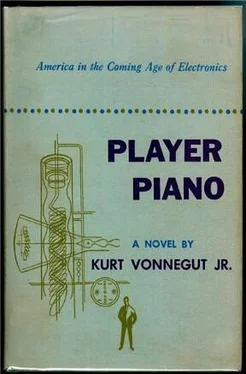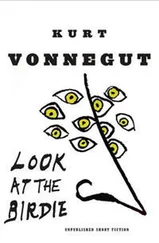Paul pretended he hadn't heard, and turned his attention to Finnerty, who dug a spoon around and around and around in a sugar bowl. Some of the white grains spilled over, and Finnerty absently drew the mathematical symbol for infinity in them with the tip of his finger.
"Funny what I expected from this reunion, what I guess everybody expects from affectionate reunions. I thought seeing you would somehow clear up all sorts of problems, get me thinking straight," said Finnerty. He had a candor about his few emotional attachments that Paul found disquieting. He used words to describe his feelings that Paul could never bring himself to use when speaking of a friend: love, affection, and other words generally consigned to young and inexperienced lovers. It wasn't homosexual; it was an archaic expression of friendship by an undisciplined man in an age when most men seemed in mortal fear of being mistaken for pansies for even a split second.
"I guess I looked forward to some sort of rebirth too," said Paul.
"But you find out quick enough that old friends are old friends, and nothing more - no wiser, no more help than anyone else. Well, what the hell, that doesn't mean I'm not damned pleased to see you again."
"No booth service until eight," called the bartender.
"I'll get them," said Finnerty. "What'll it be?"
"Bourbon - plain water. Make it a weak one. Anita's expecting us in an hour."
Finnerty came back with two strong highballs.
"Is there any water in it?" said Paul.
"There was enough water in it as it was." Finnerty swept the sugar from the table with his palm. "It's the loneliness," he said, as though picking up the thread of a conversation that had been interrupted. "It's the loneliness, the not belonging anywhere. I just about went crazy with loneliness here in the old days, and I figured things would be better in Washington, that I'd find a lot of people I admired and belonged with. Washington is worse, Paul - Ilium to the tenth power. Stupid, arrogant, self-congratulatory, unimaginative, humorless men. And the women, Paul - the dull wives feeding on the power and glory of their husbands."
"Oh, now listen, Ed," said Paul, smiling, "they're good-hearted people."
"Who isn't? I'm not, I guess. Their superiority is what gets me, this damn hierarchy that measures men against machines. It's a pretty unimpressive kind of man that comes out on top."
"Here come some more!" called the man with the thick glasses from the door. From far off came the sound of marching, and the thump of a bass drum. The noise came closer, a whistle blew, and a brass band exploded with music.
Paul and Finnerty hurried to the door.
"Who are they?" shouted Finnerty at the man in thick glasses.
The man smiled. "Don't think they want anybody to know. Secret."
At the head of the procession, surrounded by four trumpeters dressed as Arabs, was a florid, serious old man in a turban and pantaloons, carefully cradling in his arms an elephant tusk inscribed with mysterious symbols. Behind him came an enormous square banner, held aloft by a staggering giant, and steadied in the wind, maypole fashion, by a dozen Arabs tugging at colored ropes. The banner, which from a distance had given promise of explaining all, was embroidered with four lines of long-forgotten - or perhaps recently invented - script, and with four green owls against a field of apricot. After it came the band, which carried out the Arabian motif. There were owl-bearing pennants hung from the brasses, and the banner's message was repeated, in case anyone had missed it, on a cart-borne bass drum perhaps twelve feet in diameter.
"Hooray," said the man in thick glasses mildly.
"Why are you cheering?" said Finnerty.
"Don't you think something's called for? Cheering Luke Lubbock mostly. He's the one with the tusk."
"Doing a swell job," said Finnerty. "What's he represent?"
"Secret. He couldn't be it any more, if he told."
"Looks like he's about the most important thing."
"Next to the tusk."
The parade turned a corner, the whistle blew again, and the music stopped. Down the street, another whistle shrilled, and the whole business began again as a company of kilted bagpipers swung into view.
"Parade competition down at the park," said the man with the glasses. "They'll be coming by for hours. Let's go in and have a drink."
"On us?" said Finnerty.
"Who else?"
"Wait," said Paul, "this should be interesting."
An automobile had just come from the north side of the river, and its driver honked irritably at the marchers, who blocked his way. The horn and the bagpipes squalled at one another until the last rank of marchers had turned down the side street. Paul recognized the driver too late to get out of sight. Shepherd looked at him with puzzlement and mild censure, waved vaguely, and drove on. Peering through the back window were the small eyes of Fred Berringer.
Paul refused to attach any importance to the incident. He sat down in the booth with the short, heavy man, while Finnerty went after more drinks.
"How's your son?" said Paul.
"Son, Doctor? Oh, oh, of course - my son. You said you were going to talk to Matheson about him, didn't you? What did the good Matheson say?"
"I haven't seen him yet. I've been meaning to, but the opportunity hasn't come up."
The man nodded. "Matheson, Matheson - beneath that cold exterior, there beats a heart of ice. Well, it's just as well. There's no need to talk to him now. My boy's all set."
"Oh, really? I'm glad to hear that."
"Yes, he hanged himself this morning in the kitchen."
"Lord!"
"Yes, I told him what you said yesterday, and it was so discouraging that he just gave up. It's the best way. There are too many of us. Upps! You're spilling your drink!"
"What's going on here?" said Finnerty.
"I was just telling the Doctor here that my son couldn't find any good reason for being alive, so he quit it this morning - with an ironing cord."
Paul covered his eyes. "Jesus, oh Jesus I'm sorry."
The man looked up at Finnerty with a mixture of bewilderment and exasperation. "Now, hell, why'd I have to go and do that? Have a drink, Doctor, and pull yourself together. I haven't got a son, never had one." He shook Paul's arm. "Hear me? It's a lot of crap."
"Then why don't I bust your stupid head open?" said Paul, half standing in the booth.
"Because you're wedged in too tightly," said Finnerty, pushing him back down. He set the drinks before them.
"Sorry," said the man to Paul. "I just wanted to see how one of those superbrains worked. What's your I.Q., Doctor?"
"It's a matter of record. Why don't you go look it up?" It was a matter of record. Everyone's I.Q., as measured by the National Standard General Classification Test, was on public record - in Ilium, at the police station. "Go on," he said acidly, "experiment with me some more. I love it."
"You picked a bad specimen if you're out to find out what the rest of them across the river are like," said Finnerty. "This guy's an odd one."
"You're an engineer too."
"Until I quit."
The man looked surprised. "You know, this is really very illuminating, if you're not kidding me. There are malcontents, eh?"
"Two that we know of," said Finnerty.
"Well, you know, in a way I wish I hadn't met you two. It's much more convenient to think of the opposition as a nice homogeneous, dead-wrong mass. Now I've got to muddy my thinking with exceptions."
"How have you got yourself typed," said Paul, "as an upstate Socrates?"
"The name is Lasher, the Reverend James J. Lasher, R-127 and SS-55. Chaplain, Reconstruction and Reclamation Corps."
"The first number's for Protestant minister. What's the second, that SS thing?" said Finnerty.
"Social scientist," said Lasher. "The 55 designates an anthropologist with a master's degree."
Читать дальше








![Курт Воннегут - Вампитеры, фома и гранфаллоны [litres]](/books/397997/kurt-vonnegut-vampitery-foma-i-granfallony-litre-thumb.webp)